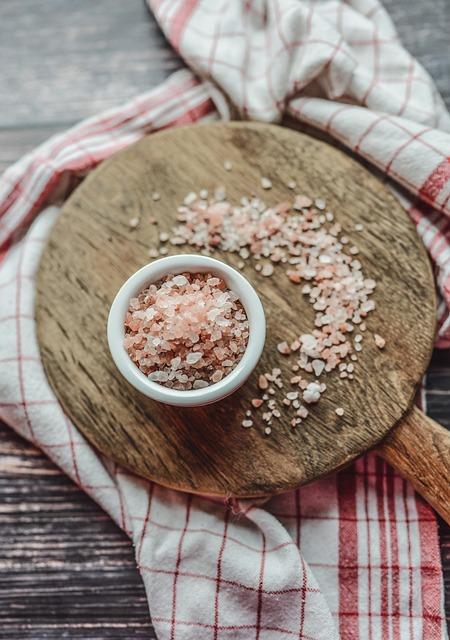Is Salt Considered a Condiment? A Culinary Investigation
Hey there foodies! Have you ever stopped to ponder whether salt is truly a condiment or not? Join us on a culinary investigation as we dive into the world of seasonings and explore whether salt deserves a spot alongside the likes of ketchup and mustard. Get ready to uncover the truth behind this kitchen staple and impress your friends with your newfound culinary knowledge! Let’s settle the debate once and for all – is salt considered a condiment? Let’s find out together.
Contents
- Is Salt a Key Flavor Enhancer in Cooking?
- Exploring the Origins of Salt as a Culinary Staple
- The Role of Salt in Balancing Flavors and Enhancing Taste
- Why Salt is Essential in Various Cuisines Around the World
- Different Types of Salt and Their Culinary Applications
- Understanding the Health Implications of Consuming Salt
- Tips for Using Salt Wisely in Cooking
- Experimenting with Salt as a Versatile Condiment in Your Kitchen
- Key Takeaways
Is Salt a Key Flavor Enhancer in Cooking?
Salt has long been a staple in the culinary world, known for its ability to enhance flavors and bring out the best in dishes. But is salt truly a key flavor enhancer in cooking, or is it simply a condiment that we sprinkle on our food out of habit?
While salt is indeed considered a condiment, it plays a crucial role in cooking by enhancing the natural flavors of ingredients and balancing out the taste of a dish. Here are some reasons why salt is an essential flavor enhancer:
- Enhances Flavor: Salt can intensify the taste of food by bringing out the natural flavors of ingredients.
- Balances Taste: Salt helps to balance the sweetness, bitterness, and acidity of a dish, creating a harmonious flavor profile.
- Improves Texture: Salt can also help to improve the texture of certain foods, such as breaking down proteins in meat to make them more tender.
So, while salt may be seen as a simple condiment, its role in cooking should not be underestimated. When used in moderation, salt can truly elevate the taste of a dish and bring out the best in every bite.

Exploring the Origins of Salt as a Culinary Staple
In the world of culinary arts, salt is often regarded as a fundamental ingredient that can make or break a dish. But is salt truly just a condiment, or does it hold a deeper significance in the realm of cooking? Let’s delve into the origins of salt as a culinary staple and explore its multifaceted role in the kitchen.
**Historical Roots of Salt**
- Salt has been used for thousands of years as a natural preservative for food.
- Ancient civilizations such as the Egyptians and Romans prized salt for its ability to enhance flavors and extend the shelf life of perishable goods.
- The salt trade played a pivotal role in shaping economies and societies throughout history.
**Culinary Versatility of Salt**
- Salt is not just a seasoning; it also plays a crucial role in bringing out the natural flavors of ingredients.
- From curing meats to enhancing the sweetness of desserts, salt is a versatile ingredient that can be used in a myriad of ways.
- Professional chefs often experiment with different types of salt, such as Himalayan pink salt or sea salt, to add depth and complexity to their dishes.

The Role of Salt in Balancing Flavors and Enhancing Taste
When it comes to cooking and creating flavorful dishes, salt plays a crucial role in balancing flavors and enhancing taste. This essential ingredient is often used to bring out the natural flavors of ingredients, as well as to add depth and complexity to dishes. Salt is not just a seasoning, but it is also considered a condiment in the culinary world.
By using salt strategically in your cooking, you can elevate the taste of your dishes and create a more well-rounded flavor profile. Whether you are seasoning a steak before grilling, sprinkling salt on freshly sliced tomatoes, or adding a pinch to a decadent dessert, salt has the power to transform a dish from good to great. It is all about finding the right balance and knowing how to use salt to enhance the other flavors in your dish.
| Benefits of Salt in Cooking: |
|---|
| Enhances natural flavors |
| Improves overall taste |
| Creates depth and complexity |

Why Salt is Essential in Various Cuisines Around the World
One of the most essential ingredients in cuisines around the world is salt. While some may not consider salt a condiment in the traditional sense, its importance in enhancing flavors and bringing out the best in dishes cannot be understated.
**Here are a few reasons why salt is considered essential in various cuisines:**
- Enhances flavors: Salt has the ability to enhance the natural flavors of ingredients in a dish, making them more vibrant and delicious.
- Balances sweetness: Salt can balance out the sweetness in dishes, creating a more harmonious flavor profile.
- Preservation: Salt has been used for centuries as a method of preserving food, allowing cultures around the world to enjoy ingredients long after they are harvested.
In conclusion, while salt may not be traditionally viewed as a condiment, its role in various cuisines is undeniable. Its ability to enhance flavors, balance sweetness, and preserve ingredients make it a staple in kitchens worldwide.

Different Types of Salt and Their Culinary Applications
Salt is a staple in almost every kitchen, but did you know that there are actually different types of salt that can be used for various culinary applications? From table salt to sea salt to kosher salt, each type of salt offers a unique flavor profile and level of salinity that can enhance the taste of your dishes in different ways.
Table salt is the most common type of salt and is typically iodized. It is fine-grained and perfect for everyday use, from seasoning your pasta water to adding a pinch to your scrambled eggs. Sea salt, on the other hand, is harvested from evaporated seawater and comes in a variety of textures, from fine to coarse. It is great for finishing dishes and adding a pop of flavor and crunch. Finally, kosher salt has a larger grain size and is preferred by many chefs for its ability to evenly season meat and vegetables.
| Type of Salt | Culinary Application |
|---|---|
| Table Salt | Everyday seasoning and cooking |
| Sea Salt | Finishing dishes and adding flavor |
| Kosher Salt | Evenly seasoning meat and vegetables |

Understanding the Health Implications of Consuming Salt
Many people consider salt to be a simple condiment that enhances the flavor of food. However, the reality is that consuming too much salt can have serious health implications. Here’s why you should be more mindful of your salt intake:
- Blood Pressure: Excessive salt consumption can lead to high blood pressure, increasing the risk of heart disease and stroke.
- Water Retention: Salt can cause the body to retain water, leading to bloating and swelling.
- Kidney Function: Too much salt can put a strain on the kidneys, potentially leading to kidney damage over time.
| Salt Consumption | Health Implications |
|---|---|
| Excessive | High blood pressure, water retention, kidney damage |
| Moderate | Normal blood pressure, balanced water retention, healthy kidneys |
| Low | Reduced risk of hypertension, bloating, and kidney issues |
So next time you reach for the salt shaker, remember that moderation is key when it comes to your health.

Tips for Using Salt Wisely in Cooking
When it comes to seasoning your dishes, salt is a staple ingredient in any kitchen. But is salt truly considered a condiment? Let’s dive deeper into this culinary investigation to uncover the role of salt in cooking.
Using salt wisely in your cooking can enhance the flavors of your dishes while also providing essential nutrients to your body. Here are some tips to help you make the most of salt in your culinary creations:
- Season as you go: Add salt gradually throughout the cooking process to layer flavors and prevent over-salting.
- Experiment with different types of salt: From kosher to sea salt, each type brings a unique flavor profile to your dishes.
- Balance flavors: Salt should enhance the natural flavors of your ingredients, not overpower them. Taste as you cook and adjust accordingly.
Experimenting with Salt as a Versatile Condiment in Your Kitchen
Salt has long been a staple in kitchens around the world, but is it really considered a condiment? Let’s delve into this culinary investigation and discover the versatile ways in which salt can enhance the flavors of your dishes.
When used judiciously, salt can act as a flavor enhancer, helping to bring out the natural taste of ingredients in a dish. Whether you’re seasoning a steak before grilling, sprinkling a pinch over fresh tomatoes, or adding a touch to a sweet treat, salt has the power to elevate the overall flavor profile of a recipe.
Here are a few creative ways you can experiment with salt in your kitchen:
- Try making flavored salts by mixing sea salt with herbs, spices, or citrus zest.
- Use salt to rim cocktail glasses for an added burst of flavor.
- Discover the world of finishing salts, such as Himalayan pink salt or black lava salt, to add a unique touch to your dishes.
Key Takeaways
In conclusion, salt is indeed considered a condiment in the culinary world. It may seem simple and basic, but its importance in enhancing flavors and bringing out the best in food cannot be overstated. While it may not be as flashy as other condiments, it plays a crucial role in countless dishes around the world. So next time you reach for the salt shaker, remember that you are not just seasoning your food, but adding a key component to your culinary creations. Happy cooking!







